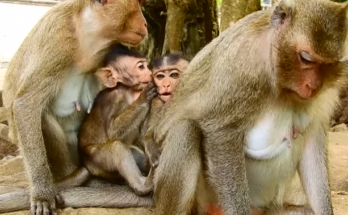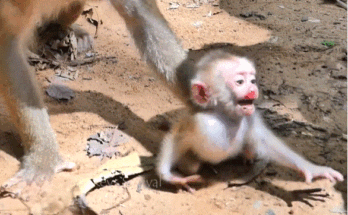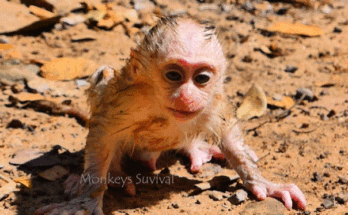I remember that early morning like a waking dream—mist drifting through ancient stones, birds calling from mossy canopies, and there she was: Milina, a soft-furred mother sitting amidst centuries-old ruins, cradling her newborn. The world felt impossibly still.
Milina’s eyes met her baby’s for the first time—bright, curious, trembling. She let out a gentle, unguarded murmur. In that moment, something shifted in me. I wasn’t a distant observer—I felt the stirrings of every human parent who’s ever held their child, the quiet gravity of new life.
Angkor Wat’s stones seemed to lean closer. The lush green ferns whispered that even here, in this ancient sanctuary, the bond of mother and child is timeless and sacred.

The baby yawned, tiny fingers reaching toward fallen petals. Milina’s reaction was tender but cautious—one second awe, one second fierce protection. I could almost hear her thoughts: “You are mine, and I will keep you safe.”
All around us, the forest exhaled. Sunbeams pierced the canopy, dancing across the temple walls. In that glow, Milina groomed her baby, the serene moment a fragile tether between ancient emptiness and newborn warmth.
Later, I learned more of her species, of how wild mothers protect with surprising strength—and how rare it is to see such calm, such connection. I thought of U.S. mothers I know—those nursing in hospital nurseries, those rocking babies at home, those awake at midnight—our experiences may differ, but the heartbeat of motherhood is universal.
I felt tears in my eyes—not just for what I witnessed, but for the connection we all share: the awe when a child enters the world.
As I walked away, Angkor’s stones stood silent again, but inside me, Milina’s gentle cry lingered—a reminder that in wild places and human cities alike, love begins with that first, fragile moment of connection.


